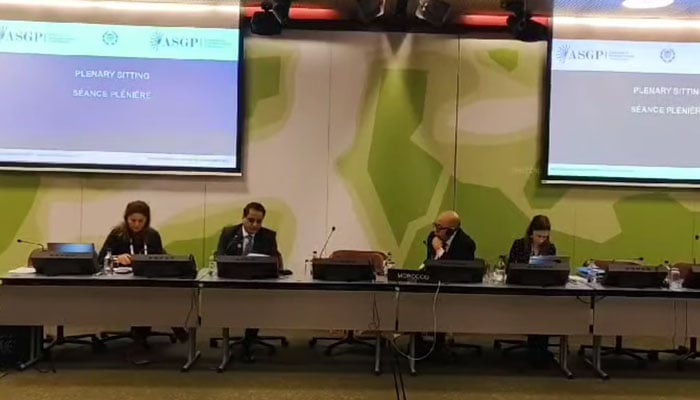‘Climate change, water scarcity deeply interconnected issues’
Theme of the sessions is “Managing Conflicting Competencies Between Parliamentary Committees”
ISLAMABAD: The Special Secretary of the Senate, Hafeezullah Sheikh, said that climate change, food security, water scarcity, and energy transitions are multidimensional, deeply interconnected issues and not confined to a single policy domain or ministry.
He expressed these views Wednesday at the Association of Secretaries General of Parliaments’ (ASGP) Autumn Session which is being held in Geneva, Switzerland. The theme of the sessions is “Managing Conflicting Competencies Between Parliamentary Committees”.
ASGP is a consultative body of the IPU. Highlighting the causes, Hafeezullah informed the participants that overlapping mandates, ambiguous rules and the evolving nature of challenges create complexity.
He said that parliamentary committees are often structured according to ministries, meaning that challenges crossing several domains tend to create overlaps and as a result, conflicting competencies arise, with committees duplicating efforts or offering contradictory solutions.
The Challenge of Conflicting Competencies, he emphasized, is real and that conflicting competencies among parliamentary committees often arise due to overlapping mandates, ambiguous rules, and political dynamics.
He stressed the need to address this growing challenge and adopt a range of strategies to enhance coordination among committees. He observed that one of the most effective ways to manage conflicting competencies is ensuring that each parliamentary committee has a clearly defined mandate and specific areas of jurisdiction.
The Senate Rules of Procedure, he explained, explicitly outline committee jurisdictions and requires special permission from the Chairman Senate in cases of overlap. “This minimizes the likelihood of conflict and helps to maintain clarity regarding which committee is responsible for,” he noted.
The Senate, he said, has established a formal coordination mechanism, and the Council of Committee Chairmen, a forum comprising the heads of standing and functional committees, plays a key role in resolving jurisdictional disputes and promoting coordination across committees.
He said that in the face of complex, interconnected issues, parliaments may consider grouping related committees into clusters. He also highlighted the significance of regular reviews, capacity building and training.
Pakistan’s Parliament, especially the Senate, he continued, has implemented several mechanisms to streamline committee functions and prevent overlaps. Joint committees of the Parliament, Parliamentary Caucuses, Women Parliamentary Caucus and Committee of the Whole House are some of the solutions to address the challenge.
He suggested improving communication, strengthening Rules of Procedure, and enhancing collaboration through Joint Committees and Clusters to help parliaments handle overlapping situations and work more cohesively. He also called for a multi-disciplinary, collaborative approach and better coordination to ensure more efficient parliamentary functioning.
“By working together, we can overcome these challenges and create a more robust, coordinated parliamentary system,” he concluded.
-
 Heidi Klum Gushes Over Diplo Collab 'Red Eye' Despite DJ Falling Asleep During Video
Heidi Klum Gushes Over Diplo Collab 'Red Eye' Despite DJ Falling Asleep During Video -
 Israel Behind Majority Of Journalist Deaths Worldwide, Watchdog Claims
Israel Behind Majority Of Journalist Deaths Worldwide, Watchdog Claims -
 'It Would Become A Circus' : Inside Jane's Turmoil For 'little Sister' Fergie Whose Hidden From The World
'It Would Become A Circus' : Inside Jane's Turmoil For 'little Sister' Fergie Whose Hidden From The World -
 Inside Cardi B's Real Feelings Related To Stefon Diggs Split Post One Year Of Romance
Inside Cardi B's Real Feelings Related To Stefon Diggs Split Post One Year Of Romance -
 Former Sri Lankan Intelligence Chief Arrested Over 2019 Easter Bombings
Former Sri Lankan Intelligence Chief Arrested Over 2019 Easter Bombings -
 Kristen Bell Shares One Rule For 'SAG' Awards Ceremony That She Will Ditch This Time: 'Happy And Fun'
Kristen Bell Shares One Rule For 'SAG' Awards Ceremony That She Will Ditch This Time: 'Happy And Fun' -
 Woman Suing Meta Platforms, YouTube Over Social Media Addiction Sticks To Claims After Trial
Woman Suing Meta Platforms, YouTube Over Social Media Addiction Sticks To Claims After Trial -
 Shakira Applauded For 'gracious' Behaviour By Fans As She Blends Work With Family Downtime
Shakira Applauded For 'gracious' Behaviour By Fans As She Blends Work With Family Downtime -
 Prince William Hits The Roof With The Andrew Saga Bleeding Into Earthshot
Prince William Hits The Roof With The Andrew Saga Bleeding Into Earthshot -
 Mexico’s President Considers Legal Action Over Elon Musk Cartel Remark
Mexico’s President Considers Legal Action Over Elon Musk Cartel Remark -
 HBO Gives Major Update About 'Industry' Season Five And Show's End
HBO Gives Major Update About 'Industry' Season Five And Show's End -
 Donnie Wahlberg Responds To 'Boston Blue' Backlash: 'Nobody Was More Disappointed Than Me'
Donnie Wahlberg Responds To 'Boston Blue' Backlash: 'Nobody Was More Disappointed Than Me' -
 Jennifer Garner Gets Emotional Over Humble Career Start: 'It Makes Me Want To Cry'
Jennifer Garner Gets Emotional Over Humble Career Start: 'It Makes Me Want To Cry' -
 Princess Beatrice Told An Acquaintance That She ‘likes’ Jeffrey Epstein: Grim Verdict Drops
Princess Beatrice Told An Acquaintance That She ‘likes’ Jeffrey Epstein: Grim Verdict Drops -
 Late Katherine Short's Neighbours Give Insights Into Her 'peace Loving' Personality Post Suicide
Late Katherine Short's Neighbours Give Insights Into Her 'peace Loving' Personality Post Suicide -
 Fresh Details Of King Charles, Queen Camilla's US Visit Emerge Amid Andrew Investigation
Fresh Details Of King Charles, Queen Camilla's US Visit Emerge Amid Andrew Investigation




